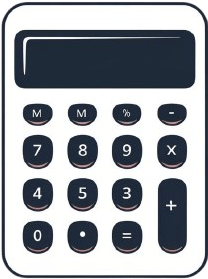How Our Sleep Calculator Works
Our sleep calculator uses the average 90-minute sleep cycle to determine optimal wake times:
- Enter your bedtime (or click “Now” for the current time)
- Select your desired hours of sleep (7-9 hours recommended for adults)
- Click “Calculate” to see your ideal wake-up times
The calculator will show:
- Your specific wake time based on desired hours
- Additional optimal times based on complete sleep cycles
By waking at these suggested times, you’re more likely to feel refreshed and energized, ready to tackle the day ahead.
Understanding Sleep Cycles and Optimal Rest
What Are Sleep Cycles?
Sleep isn’t a uniform state but consists of distinct cycles, each lasting approximately 90-110 minutes. During a typical night, the human body progresses through 4-6 complete cycles. Each cycle contains four main stages:
- Stage 1 (N1): Light sleep where you drift in and out of consciousness (1-5 minutes)
- Stage 2 (N2): Body temperature drops and heart rate slows as you prepare for deep sleep (10-25 minutes)
- Stage 3 (N3): Deep sleep, crucial for physical recovery and immune function (20-40 minutes)
- REM Sleep: Rapid Eye Movement sleep, when most dreaming occurs and memory consolidation happens (10-60 minutes)
Why Sleep Cycles Matter
Waking up at the end of a complete sleep cycle, rather than in the middle, can significantly impact how you feel upon waking. When your alarm interrupts deep sleep, you experience “sleep inertia” – that groggy, disoriented feeling that can persist for hours.
Our calculator helps you time your sleep so you wake at the end of a complete cycle, when you’re naturally closer to wakefulness. This approach can help you feel more refreshed and alert, even if you’ve had fewer total hours of sleep.
Optimal Sleep Duration by Age
Sleep needs vary significantly throughout life:
| Age Group | Recommended Hours |
|---|---|
| Newborns (0-3 months) | 14-17 hours |
| Infants (4-12 months) | 12-16 hours |
| Toddlers (1-2 years) | 11-14 hours |
| Preschoolers (3-5 years) | 10-13 hours |
| School-age children (6-12 years) | 9-12 hours |
| Teenagers (13-18 years) | 8-10 hours |
| Adults (18-64 years) | 7-9 hours |
| Older adults (65+ years) | 7-8 hours |
Most adults need between 7-9 hours of quality sleep, which typically equates to 4-6 complete sleep cycles. Our calculator defaults to settings that work well for most adults, but you can adjust based on your personal needs.
The Science of Sleep and Brain Health
Brain Cleaning During Sleep
One of sleep’s most fascinating functions is its role in brain maintenance. During deep sleep, the brain activates its glymphatic system—a recently discovered waste clearance system that removes harmful substances.
This process includes the removal of amyloid-beta proteins, which are associated with Alzheimer’s disease when they accumulate. The glymphatic system becomes up to 10 times more active during sleep than wakefulness, effectively flushing out these potentially harmful substances.
Memory Consolidation and Learning
Sleep plays a crucial role in cognitive function, particularly memory formation:
- During deep sleep: The brain transfers information from short-term to long-term memory
- During REM sleep: The brain processes complex emotions and memories, making connections between new information and existing knowledge
Students who prioritize sleep before exams often perform better than those who sacrifice sleep for extra study time. This is because sleep helps cement newly learned information in the brain.
Tips for Optimizing Your Sleep Quality
Establish a Consistent Sleep Schedule
- Go to bed and wake up at the same time every day, even on weekends
- Use our calculator to determine your ideal bedtime based on when you need to wake up
Create an Optimal Sleep Environment
- Keep your bedroom cool (65-68°F/18-20°C is ideal)
- Minimize noise and light disruptions
- Invest in a comfortable mattress and pillows
Develop a Bedtime Routine
- Avoid screens 1-2 hours before bed (blue light suppresses melatonin)
- Engage in relaxing activities like reading, gentle stretching, or meditation
- Take a warm bath or shower 1-2 hours before bedtime
Watch What You Consume
- Avoid caffeine after midday
- Limit alcohol, as it disrupts REM sleep
- Avoid large meals within 3 hours of bedtime
- Stay hydrated throughout the day, but reduce fluids close to bedtime
Manage Stress and Anxiety
- Practice relaxation techniques like deep breathing or progressive muscle relaxation
- Keep a notebook by your bed to write down worries or to-do lists
- Consider meditation apps designed for sleep
Signs You’re Getting Good Quality Sleep
You’re likely getting good quality sleep if:
- You fall asleep within 15-20 minutes of lying down
- You sleep through the night with minimal awakenings
- You wake up feeling refreshed, not groggy
- You feel alert throughout the day without excessive daytime sleepiness
When to Seek Professional Help
Consider consulting a healthcare provider if you:
- Consistently struggle to fall or stay asleep
- Snore loudly or gasp for air during sleep
- Feel excessively tired despite adequate sleep time
- Experience significant mood changes related to sleep
Remember that sleep is not a luxury but a biological necessity. Prioritizing sleep is one of the most impactful ways to improve your overall health, cognitive function, and quality of life.








Leave a Reply